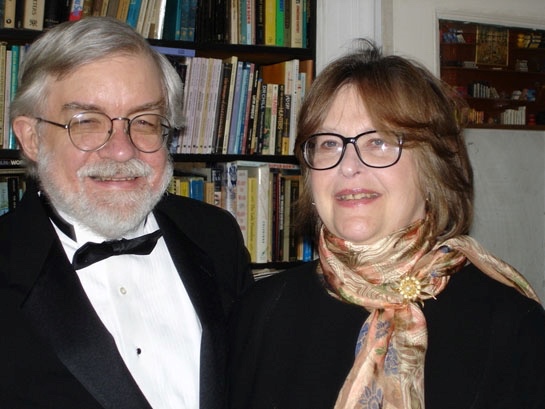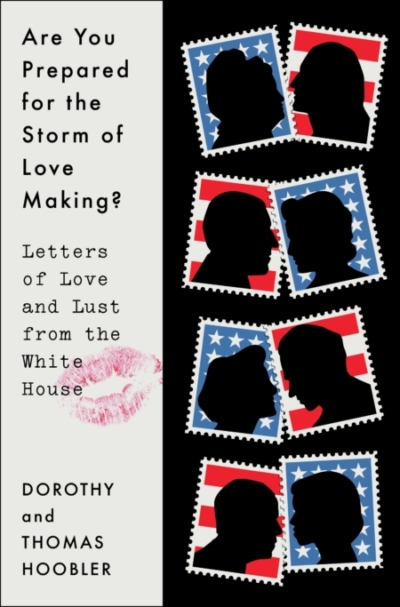
By Michele Willens
Dorothy and Thomas Hoobler are now in their 80s and have lived on the Upper West Side since, as Dorothy says, ”well before it was hip.” They met in 1971 and moved here shortly after. From their rent-stabilized apartment on West End Avenue, they have written many books, but the latest may be their most noteworthy. “Are You Prepared For the Storm of Love Making?” was just released this month by Simon & Schuster, and reveals the very private correspondences between those in the Oval Office and the women in their lives. Publishers Weekly said, “readers will relish the tender exchanges and juicy revelations in this humanizing portrait.”

Humanizing, indeed. For example, we may be shocked to discover that something akin to poetry poured from Richard Nixon’s pen. In fact, as Thomas Hoobler explains, “this whole project started, five years ago, when we discovered a letter from Dick to Pat. It got us wondering if there were any more like that from others.”
Some are less surprising. We recently saw Jimmy Carter…on a hospital bed, clearly unconscious, in the church for his wife Rosalyn’s funeral. But then, anyone who knew their lifelong love story would not be surprised. When Jimmy was in the service, his letters home to his girlfriend were filled with..dare I say…lust in his heart.
John and Abigail Adams famously wrote more than a thousand letters. (Including the one when she warned him not to forget about the women when making new laws.) But many of these are less predictable. For example, Warren Harding was not as buttoned-up as he looked. A saucy poem he penned for a lover a century ago begins: “I love your poise/Of perfect thighs/When they hold me/In Paradise.”
And how about from the first Father of the Country? George Washington may have professed never to tell a lie, but the Hooblers reveal a letter he penned to another man’s wife in 1758: a few weeks before he was to marry Martha Custis. Six years after Thomas Jefferson was widowed, he also was sending ardent notes to a married woman. “You esteem me as much as I deserve,” he told Maria Cosway in 1788. “If I love you more, it is because you deserve more.”
“May the Goddess of Slumber every evening light on your eyebrows…”
And the beat goes on. We learn that the famously tough Andrew Jackson was also a would-be romantic wordsmith. As when he wrote his beloved, “May the Goddess of Slumber every evening light on your eyebrows and gently lull you to sleep, and conduct you through the night with pleasing thoughts and pleasant dreams.” Woodrow Wilson gets heavy play here. “When his first wife was dying,” says Thomas, “he asked his doctor to find him a second one. The doctor did, and Wilson’s love letter to her comes just a year after the first one’s death.” The book cleverly gives us full stories of each couple, leading up to, and including, their correspondence.
Things even get a bit rambunctious. We hear of Dolly Madison’s habit, late in life, of hefting her elderly husband onto her back and romping around the room with him, “whenever she particularly wished to impress him with a due sense of man’s inferiority.” (I expect Emma Stone and Mark Ruffalo are considering a movie reunion as we speak. Kidding!)
What has not changed is the Hooblers’ curiosity, and they were constantly entertained during this particular journalistic journey. “It’s just so interesting to see the differences between their public and private selves,” notes Dorothy. Or, occasionally, not so much. The voice of LBJ’s letters, for example, carry the Texan’s swagger. He may have been devoted to Lady Bird, but his relationship with Doris Kearns Goodwin was always questioned, as was his dalliance with former Congresswoman Helen Gahagan Douglas.
“We tried and tried with Bill Clinton…but we got no replies.”
Not every Oval occupant is included. “We tried and tried with Bill Clinton,” says Thomas, “but we got no replies.” As for the Kennedys, he says, “it was difficult to find anything between them. Jackie later said she had received only one love letter from John, and it was a postcard from the Caribbean saying, ‘wish you were here.’ As for the Obamas, Dorothy says, “Michelle insisted on phone calls, but Barack was the first to use email and the like. One tweet from him said “I knew it was you back then…..”
That, and most of the materials discovered, came from presidential libraries, or just plain libraries that have collections from Presidents. The Hooblers—when not dining at their favorite hangouts Five Napkin Burger, Nice Matin and The Dumpling House—rarely stop working. “But we do love strolling this community and how we all know our neighbors,” says Dorothy, “though of course a lot has changed. You don’t find the small button stores anymore, but you still find a friendly community. And there’s always Zabar’s.”
Oh, about that title. Those words–warning about the storms of love making– were actually written by Woodrow Wilson, to his wife of ten years. Hey, how many of us can say we’ve uttered or heard the same?
Michele Willens is the the co-author of the play, “Don’t Blame Me, I Voted for Helen Gahagan Douglas.”
Subscribe to WSR’s free email newsletter here.









Yea! This is a terrific book written by wonderful neighbors and friends. Hope they sell a million copies.
Warren Harding was one of the great philanderers of all time. On a cross country trip with Mrs. Harding in 1923, his secret service detail was challenged to protect the young women met along the way from the President’s advances. When they reached San Francisco, Mrs. Harding was fed up with Warren. He died that night of an alleged heart attack, but since Mrs. Harding had his body cremated 90 minutes after his death, it is believed that she poisoned him.